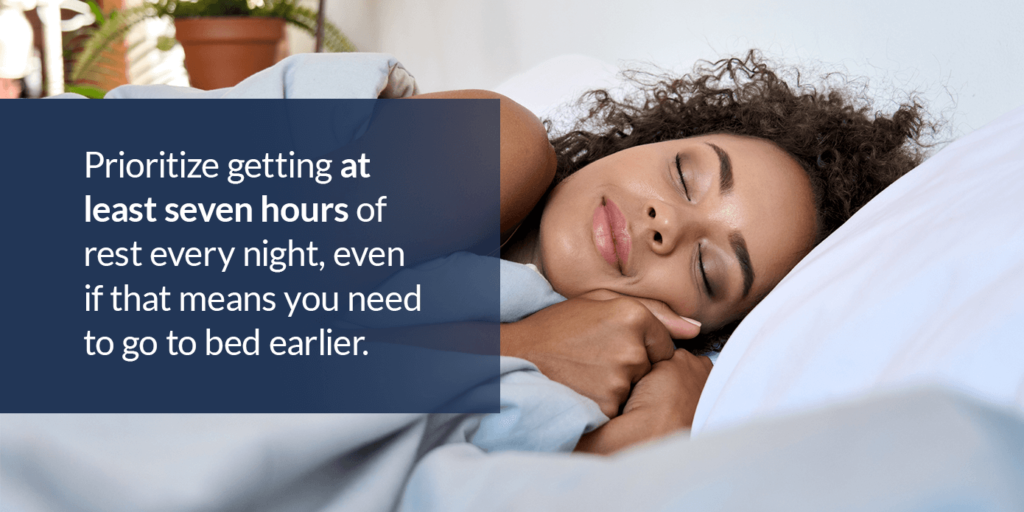Whether you’re a student or a full-time employee, you probably have many obligations. You might start feeling out of control with so many tasks to complete each day. And if you haven’t established a routine, completing your responsibilities and sustaining your energy levels will be challenging. Keeping track of a to-do list is even harder for those struggling with a mental health condition or migraines.
Simple daily habits can help your mental health and boost your overall well-being in many ways, including reducing migraine attacks. But what are the elements of a consistent routine, and how do you implement one in your daily life?
Read on for tips on developing a routine for mental health and migraine.
Why Is Routine Important for Mental Health?
Establishing predictable daily patterns benefits your mental well-being in many ways.
- Lowers anxiety: Anxiety often builds because of the unknown. It can be stressful when we can’t predict what will occur in our daily lives. By following a daily routine for depression and anxiety, you let your body know what to expect. You can alleviate anxiety by having a general idea of what you’ll do tomorrow and the days after that.
- Helps you feel more in control: Routines also help you regain control of your life. It’s uncomfortable when unforeseen events keep happening. And because stress is such a significant migraine trigger, managing levels is crucial. With a healthy routine, you focus only on what you can manage each day. For instance, you could cook breakfast at the same time every morning.
- Creates healthy habits: Without a set routine, it’s easier to fall into an unhealthy rut. For example, you might spend too much time on social media or neglect mealtimes. Creating a healthy routine and sticking to it helps you make lifestyle changes. You could establish a sleep schedule by going to bed at consistent times or incorporating more fresh produce into your diet. These healthier patterns might also lower migraine frequency.
- Prevents burnout: Chronic stress can lead to burnout. Because a routine helps you manage anxiety, you could reduce fatigue and exhaustion.
Building routines can also help you navigate a hectic time in your life, such as college. Students have many responsibilities, from classes and homework to a job and extracurricular activities. Without a routine in place, you could develop unhealthy habits, miss crucial deadlines or suffer frequent migraines. Luckily, establishing a routine can help you feel more organized. You can keep track of your to-do list while remembering healthy habits like sufficient sleep.
How to Build a Routine
If you’ve never set a schedule before, you might wonder how to get started. Here are five essential components of a healthy routine.
1. Start With Sleep Hygiene
Sufficient, restful sleep is the basis of a healthy routine. Adults should get seven or more hours of sleep each night for optimal health. Getting enough sleep every night provides health benefits like:
- Improved energy levels
- Stronger immune system
- Stress relief
- Reduced migraine attacks
People often skip crucial sleep to get ahead of tasks or enjoy extra leisure time.

If you don’t have a consistent sleep schedule, make that the first step of your new routine. Prioritize getting at least seven hours of rest every night, even if that means you need to go to bed earlier. You can get enough sleep every night by:
- Going to bed at the same time each night
- Limiting screen time before bed
- Avoiding caffeine or alcohol in the hours before bedtime
2. Eat Nutritious Foods and Don’t Skip Meals
Next, proper nutrition is essential for a mental health routine. A balanced diet boosts your well-being, but people may miss meals as they rush to their next activity.
As you build your schedule, establish mealtimes at the same time every day. Try incorporating protein, fruits, vegetables and healthy carbohydrates into each meal. To prevent skipped meals, try strategies like:
- Preparing meals ahead of time
- Keeping a stock of quick meals and snacks on hand
- Scheduling lunch and snack breaks
- Waking up earlier to fit in breakfast
Your brain needs food to function properly, and healthy foods can boost your brain activity. In turn, you might feel your mental health improve.
3. Exercise
You should also make movement part of your routine. Staying active is crucial for physical and mental health. It relieves stress, keeps your body in shape and can even reduce migraine frequency.
It can seem challenging to squeeze in exercise if you have a busy schedule. Even when you don’t have time for an hour-long workout, make room for some type of movement. Whether it’s taking a walk around your apartment complex or completing a 15-minute workout circuit, plan to exercise each day.
4. Eliminate Variables
Another way to remove stress from your schedule is by eliminating variables. We make thousands of daily decisions, like choosing what to wear and where to park. Having too many options can increase feelings of stress and adversely affect your mental health.
Removing extra choices can help you save time and energy. For example, if you never know what to make for dinner, plan a few simple meals ahead of time to reduce anxiety. The fewer variables you have, the more comfortable you can feel with a routine.
5. Schedule Flexible Time
Lastly, remember that you don’t need to account for every moment of your day. You can leave wiggle room for unplanned or impulsive events, such as a dinner invitation from a friend. Schedules constantly change, so having built-in free time gives you more flexibility. For example, you might block off an hour every night that you can use however you want.
Sticking to Your Routine
Planning a routine is the first step, but sticking to it is paramount. Once you establish your routine, try to adhere to it to the best of your ability. Set reminders on your phone or a calendar to keep you on track. For instance, if you plan to eat lunch every day at 12:30, an alert on your phone will help you remember when to take a break. After you’ve established a pattern, it becomes easier to follow.
Going with the flow and deviating from your habits every so often is normal. Plans change and new issues arise, and you might have to disrupt your schedule to meet these challenges. Don’t let your routine become a new source of stress in your life. Instead, view it as a comfort.
Make CEFALY Part of Your Routine
For those with migraines, it’s impossible to undervalue the importance of a daily routine. Following a set pattern can help you manage stress and cut down on headache frequency. If you’re seeking additional relief for your migraine pain, consider using CEFALY. Our clinically proven migraine treatment device can reduce or prevent migraine attacks. You can plan for regular CEFALY use in your daily routine.
For more information on the CEFALY DUAL Enhanced device, learn more today.

